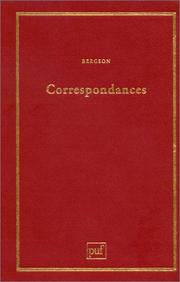| Listing 1 - 2 of 2 |
Sort by
|

ISBN: 2130520863 9782130520863 9782130837855 2130837859 Year: 2024 Publisher: Paris: PUF,
Abstract | Keywords | Export | Availability | Bookmark
 Loading...
Loading...Choose an application
- Reference Manager
- EndNote
- RefWorks (Direct export to RefWorks)
Plus qu'un supplément au recueil édité en 2002 par André Robinet, ce second volume rassemble près d'un millier de lettres, souvent inédites, adressées à plus de deux cents personnalités françaises et étrangères. Non seulement cette correspondance illustre les grandes phases de la vie de l'un des plus importants philosophes français, mais elle met également en lumière de multiples aspects de l'histoire sociale, culturelle, intellectuelle et politique de la fin du XIXe siècle et de la première moitié du XXe siècle.Bergson y apparaît sous ses facettes les plus diverses : l'étudiant, le professeur, l'académicien, le diplomate, de mème que l'époux et le père de famille. En toile de fond : le paysage intellectuel et politique de la IIIe République, les tensions internationales, les deux guerres mondiales, ainsi que nombre de temps forts de la vie de grandes institutions culturelles françaises. La variété des thèmes et des correspondants confirme avec éclat le rayonnement global d'une oeuvre qui brille d'une grande actualité -- vol. 2
Philosophers --- Philosophes --- Correspondence --- Correspondance --- Bergson, Henri, --- C orrespondence --- Bergson, Henri --- C orrespondence. --- Bergson, Henri, - 1859-1941 - Correspondence --- Bergson, Henri Louis, --- Bergson, Anri, --- Bergson, Enrico, --- Berŭgŭsong, --- Berxon, --- Bergson, Henry, --- Bergson, Henryk, --- Berŭgŭsong, Angri, --- Bergson, Enrique, --- Bergson, H. --- Bogesen, Hengli, --- בערגסאן, אנרי --- בערגסאן, אנרי, --- ברגדון, אנרי, --- ברגסון, הנרי --- ברגסון, הנרי, --- Bergson, Henri, - 1859-1941 --- Correspondance.
Book

ISBN: 9781526173485 1526173484 Year: 2024 Publisher: Manchester : Manchester University Press,
Abstract | Keywords | Export | Availability | Bookmark
 Loading...
Loading...Choose an application
- Reference Manager
- EndNote
- RefWorks (Direct export to RefWorks)
Doing psychiatry engages with the history of European psychiatry in the second half of the twentieth century through a close and fresh look at the practices that contributed to reshape the mental health field. Case studies from across Europe allow readers to appreciate how new ‘ways of doing’ contributed to transform the field, beyond the watchwords of deinstitutionalisation, the prescription of neuroleptics, centrality of patients and overcoming of asylum-era habits. Through a variety of sources and often adopting a small-scale perspective, the chapters take a close look at the way new practices emerged and at how they installed themselves, eventually facing resistance, injecting new purposes and contributing to enlarging psychiatry’s fields of expertise, therefore blurring its once-more-defined boundaries.
Psychotherapy --- Psychotropic drugs --- Social psychiatry. --- MEDICAL / History. --- Cold War. --- antipsychiatry. --- deinstitutionalisation. --- expertise. --- historical praxeology. --- patient history. --- psychopharmaceuticals. --- psychotherapy. --- social psychiatry. --- transgender medical history. --- History --- History.
| Listing 1 - 2 of 2 |
Sort by
|

 Search
Search Feedback
Feedback About UniCat
About UniCat  Help
Help News
News